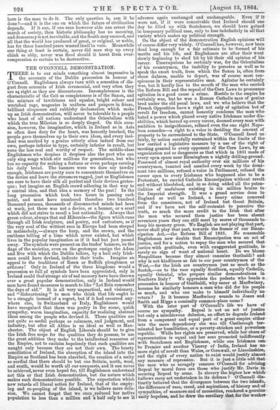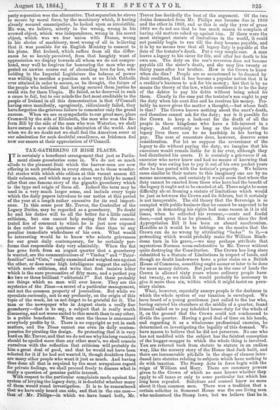THE O'CONNELL DEMONSTRATION. T HERE is to our minds something almost
impressive in the accounts of the Dublin procession in honour of O'Connell. Englishmen always turn with a sensation of dis- gust from accounts of Irish ceremonial, and very often they are tut right as they are discourteous. Incompleteness is the characteristic of the Celt as completeness is of the Saxon, and the mixture of tawdriness and squalor, bright colour and wretched rags, magnates in uniform and paupers in frieze, brilliant eloquence and rubbishy declamation which make up an Irish demonstration, will never be tolerable to a people who least of all nations understand the Orientalism with which the true Milesian is so deeply tinged. On this occa- sion, however, the imagination, which in Ireland as in Asia so often does duty for the heart, was honestly touched, the people gave themselves up to their own ideas, and every inci- dent was marked by a genius utterly alien indeed from our own, perhaps inferior in type, certainly inferior in result, but none the less real and worthy of respect. The middle-class Englishman who despises it despises also the poet who can only sing songs which stir millions for generations, but who has no capacity for making a fortune or even perhaps earning his daily bread. The banners were we dare say tawdry enough, Irishmen are pretty sure to concentrate themselves on the device and leave the streamers ragged, just as Englishmen are sure to have their silk all perfect and their devices grotes- que; but imagine an English crowd adhering in that way to a central idea, and that idea a memory of the past! In the long procession which took two hours in passing each point, and must have numbered therefore two hundred thousand persons, thousands of disconnected minds had been at work, yet there was not a device, or a banner, or a scarf which did not strive to recall a lost nationality. Always that green colour, always that sad Hibernia—the figure which runs through all Irish sculpture, and poetry, and caricature, as if the very soul of the wittiest race in Europe had been steeped in melancholy,—always the harp, and the crown, and the emblems telling of a time which never existed, but which lives in the popular imagination as if it had but just passed away. The symbols were present on the trades' banners, on the flags of the societies, even on the grotesque ensign the Adam and Eve with which the Dublin tailors, by a bull only Irish- men could have devised, indicate their trade. Imagine an appeal to the traditions of Essex or Suffolk ploughmen or artizans ! Only in Ireland of the three kingdoms would a procession so full of symbols have been appreciated, only in Ireland could that strange air of sad memory have been thrown over a great popular demonstration, only in Ireland would men have found measures to march to like "Let Erin remember the days of old." It is all very unpractical, and visionary, and " disheartening " to men who think that life ought to be a struggle instead of a regret, but if it had occurred any- where else, in Switzerland or Italy, Englishmen would have recognized that there was poetry in the scene, quick sympathy, warm imagination, capacity for realizing abstract ideas among the people who devised it. Those qualities are not quite so useful perhaps as calmness, and judgment, and industry, but after all Attica is an ideal as well as Man- chester. The object of English Liberals should be to give the Irish free scope for the qualities they do possess, to use the great addition they make to the intellectual resources of the Empire, not to exclaim hopelessly that such qualities are naught only because they are not their own. The hearty conciliation of Ireland, the absorption of the island into the Empire as Scotland has been absorbed, the creation of a unity so cordial that there should be but one Britain, north, west, and south, would be worth all our conquests, and it can never be achieved, never even hoped for, till Englishmen understand not this or that Irish demonstration, but the nature which makes such demonstrations possible. The expectation which now retards all liberal action for Ireland, that of the empty- ing and re-peopling of the island, is we believe mere delu- sion. We cannot forget that we once .reduced her native population to less than a million and a half only to see it advance again unchanged and unchangeable. Even if it were not, if it were conceivable that Ireland should one day be filled up with Scotchmen, we should have gained in temporary political ease, only to lose indefinitely in all that variety which makes up political strength.
On the object of the demonstration English opinions will of course differ very widely. O'Connell has, however, now been dead long enough for a fair estimate to be formed of his merits and his life, and Englishmen are after their wont slowly beginning to shed bit by bit their old opinion of his.
career. Unscrupulous he certainly was, for the Orientalism of his countrymen, the inability to perceive as well as to speak the exact truth, from which the Saxon is, often from sheer dulness, unable to depart, was of course most con- spicuous in their representative man. Agitator he certainly was, but it hardly lies in the mouth of the men who carried the Reform Bill and the repeal of the Corn Laws to pronounce agitation in a good cause a crime. Hostile to the empire he certainly was, but he was a Roman Catholic man of genius bred under the old penal laws, and we who believe that the French Opposition have a right not only of agitation but of revolt for freedom, cannot honestly condemn the man who- hated a power which placed every native Irishman under dis- abilities, which barred up every career, doomed every man with ambition to insignificance, refused even the one right Napo- leon concedes—a right to a voice in deciding the amount of property to be surrendered to the State. O'Connell faced us fairly, by action carefully restrained within the limits of the law carried a legislative measure by a use of the right of meeting granted to every opponent of the Corn Laws, by an organization not so dangerous as that which in 1831 made of every open space near Birmingham a nightly drilling-ground.. Possessed of almost royal authority over six millions of his countrymen, taunted and assailed every week by the domi- nant two millions, refused a voice in Parliament, refused the career open to every Irishman who happened also to be a Protestant, he carried Catholic Emancipation without revolt and without bloodshed, and in so doing added all the poten- tialities of usefulness existing in six million brains to the Imperial strength. It was a grand service done to England as well as Ireland, a heavy crime removed from the conscience, not of Ireland but Great Britain, and if we have not the self-restraint to perceive the truth, so much the more credit to the Irish that after the man who secured them justice has been absent seventeen years they can still meet by scores of thousands to keep his memory green. We English are not playing that part, never shall play that part, towards the framer of our Eman- cipation Act,—the Reform Bill of 1831. No reasonable Englishman now doubts that Emancipation was an act of justice, and for a nation to repay the man who secured that justice with gratitude, even with exaggerated gratitude, is surely no sign of want of national heart. Do we blame- Neapolitans because they almost canonize Garibaldi ? and why is not kindliness as fair to our poor countrymen of the West,—for the Irish are countrymen just as much as the- Scotch,—as to the race equally Southern, equally Catholic, equally Oriental, who prepare similar demonstrations in Southern Italy ? We appreciate tho podesta who heads a , procession in honour of Garibaldi, why sneer at MacSwiney, because he similarly honours a man who did for his people as much, and who can make to himself individually no return ? Is it because MacSwiney sounds to Jones and Smith and Higgs a comically common-place name? With the later part of O'Connell's life wo have of course no sympathy. Repeal is not an act of justice but only a mischievous delusion, an effort to degrade Ireland from a component and equal part of a great empire either- into the mere dependency she was till Castlereagh ter- minated her humiliation, or a poverty-stricken and powerless republic. While her rights are preserved, while her share of representation is equal and her sons promoted indifferently with Scotchmen and Englishmen, while one Irishman can be Premier and another Viceroy of India, Ireland has no more right of revolt than Wales, or Cornwall, or Lincolnshire, and the right of every nation to exist would justify almost any measure of repression. But it is just a little odd that the men who so savagely censure O'Connell for advising Repeal by moral force are those who justify Mr. Davis in securing Repeal by arms. Is slavery the higher law which hallows every act undertaken in its defence ? O'Connell dis- tinctly believed that the divergence between the two islands, the difference of race, creed, and aspirations, of history and of sympathies, of manners and of necessities, rendered a genuine unity hopeless, and he drew the corollary that for the weaker party separation was the alternative. That separation he strove to secure by moral force, by the machinery which, it having already secured emancipation, he looked upon as irresistible. He was, we believe, utterly in the wrong, wrong in his avowed object, which was independence, wrong in his secret object, which was we fear union with France, wrong in his choice of machinery, most wrong of all in believing that it was possible for an English Ministry to consent to his plans. But Ireland, which suffers from all the differ- ences he so keenly perceived, from that haughty want of appreciation we display towards all whom we do not compre- hend, may well be forgiven for honouring the man who sug- gested an unwise course out of abounding love for her, who holding in the Imperial Legislature the balance of power was willing to sacrifice a position such as no Irish Catholic ever attained in order to secure, as he thought, the future of the people who believed that having secured them justice he could win for them Utopia. He failed, as he deserved in such a cause to fail, but to our minds the fact most creditable to the people of Ireland in all this demonstration is that O'Connell having once manifestly, egregiously, ridiculously failed, they have forgotten the grievous failure to remember only the grand success. When we are as sympathetic to our great men, place Cromwell by the side of Elizabeth, the man who won the Re- form Bill by the side of the man who won Waterloo, we shall have earned a new claim to the admiration of the world. And when we do we doubt not we shall feel the American sneer at our admiration for such doubtful excellence, as Irishmen feel now our sneers at their appreciation of O'Connell.































 Previous page
Previous page